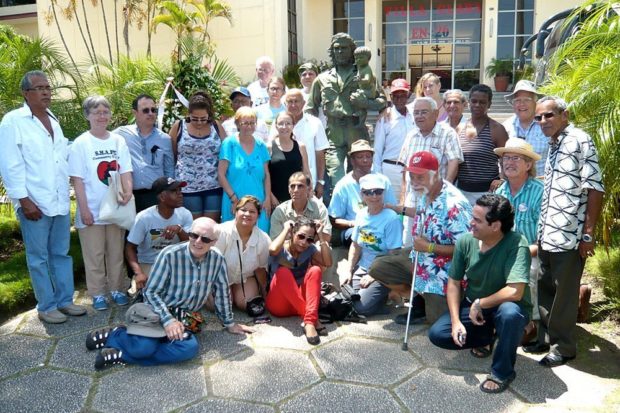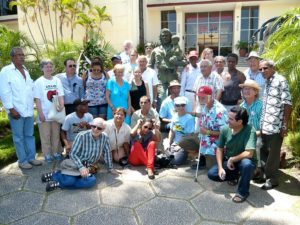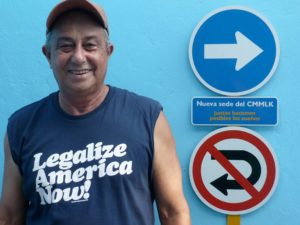
By Leni Villagomez Reeves

The 24th Pastors for Peace Caravan to Cuba will leave the United States on July 16, bound for Cuba. This is an ongoing struggle against the illegal, immoral U.S. blockade of Cuba, which uses denial of essentials such as medicine and pacemakers as a political weapon, and it is a struggle we must win, not only for the sake of Cuba but also for our own sakes, so that, at least in this case, we can stop being responsible for deliberately causing suffering.
As people of conscience, we travel to Cuba as an act of conscious civil disobedience. We are protesting both the blockade and the U.S. government’s restriction of travel to Cuba. What is it we aren’t supposed to go there and see?
Cuba is a process, not a fixed result. We’ve been taught to think of socialist countries as stagnant bureaucracies. There may have been some truth to this idea applied to Central Europe, but not to Cuba—it is the most innovative country in the world at this time.
This isn’t just my opinion: Cuba was the only nation in the world that meets the Worldwide Fund for Nature’s definition of sustainable development, for example. Cuba’s achievements in literacy, education, and health care are well known. Their biotechnology innovations are also widely recognized. They have managed some remarkable work-arounds to deal with restrictions and shortages caused by the blockade.
They have developed methods of agriculture, including urban gardens, which are innovative, organic, and use human and animal power to limit the need for fossil fuels, and their transportation alternatives include the usual buses, but also bicycle and horse-drawn transport. They have developed a system of representation that starts with elected delegates from the school, workplace and neighborhood level and eliminates the power of money in politics.

Does this all work perfectly? Of course not. Cuba has had a number of wrong and failed policies. What is remarkable is that the Cubans have been able to recognize this and change things. Cuba and its revolution are in a continuing process of reinvention, and this is obvious in regard to the attitude toward religion. Many people do not know that there are churches in Cuba. The churches are packed and there is no discouragement of religion. The initial Soviet-style anti-religion hostility has been reversed. The Cubans are pleased to be able to love both the church and the revolution without contradiction.
Another obvious change is attitudes regarding homosexuality and sexuality in general, again quite influenced by Soviet attitudes previously. There is no stigma attached to sexual differences, there is an official anti-homophobia campaign and AIDS patients are not quarantined. A Cenesex (the official government department having to do with issues of sexual preference and sexuality) worker introduced us to the concept of LGBTH, in which H is heterosexuals, just another choice in the mix.
Another recent change is the encouragement of more self-employment. This is still a work in progress with an unclear future and self-employment is on a small scale, but those who want Cuba to become a capitalist economy open to foreign exploitation are going to be disappointed. Most Cubans, not all, and some U.S. visitors, again not all, understand that the standard of comparison for Cuba may not be upper-middle-class U.S. life but rather that of other Caribbean nations, which make Cuba look very good indeed.
A note: There are millions of working children in the world. Not one of them is Cuban.
In the past year, the requirement for exit visas for travel from Cuba was eliminated. Cubans now have more legal freedom to travel than U.S. citizens, who are prohibited by the U.S. government from going to Cuba without a special license. No restrictions are placed on U.S. citizens’ travel by the Cuban government. There is no requirement to stay with a group or to be accompanied or monitored in any way. You can travel freely throughout the island.
The caravan this year will be organized differently. We will still send the message that the blockade is immoral and unacceptable and must be lifted. We will still take aid to Cuba—medications and other portable aid carried in our baggage. There will be no bus routes; we will gather in cities across North America during Cuba Caravan Week, July 8–15. The event in Fresno will be July 12 at 6:30 p.m., with potluck, music and a speaker at College Community Congregational Church (5550 N. Fresno St.).
Caravanistas from Fresno will then participate in a major event in the Bay Area on July 15, fly to Mexico City for orientation and then proceed to Santiago de Cuba.
Santiago is a wonderful city, located on hills above a harbor like a little San Francisco, but founded in 1515. I was there in 2010 and it was remarkable for the friendliness of the people, their revolutionary spirit and the vibrant music scene. It was the cradle of the revolution, where the attack on the Moncada Army Barracks took place. We’ll be able to celebrate the 60th anniversary of the start of the revolution on July 26.
Santiago suffered serious damage in Hurricane Sandy, which devastated eastern Cuba. More than 130,000 homes were lost along with schools, hospitals and other infrastructure; crops were totally destroyed. We will work with our Cuban partners to help reconstruct homes and buildings. It’s a different caravan and an exciting change. If you can’t go with us, join us for our July 12 send-off and for our report after our return.
And please, go see for yourself. If you do not wish to engage in civil disobedience or “illegal” (does the government have the right to tell you where you can travel?) personal travel, seek out a licensed cultural exchange tour. But go check it out. Cuba has many problems, but Cubans are innovative, vibrant, educated and friendly, and they are in the process of constructing a working alternative to corporate capitalism. It’s worth seeing.
*****
Leni Villagomez Reeves is a local physician and activist who has somehow divided the last 50 years into equal parts school, work, outdoor fun and struggle for a better world. “I’m going to keep on fighting as long as I can see, and if that’s what being red is, well, it’s good enough for me.” Contact her at lenivreeves@gmail.com.
